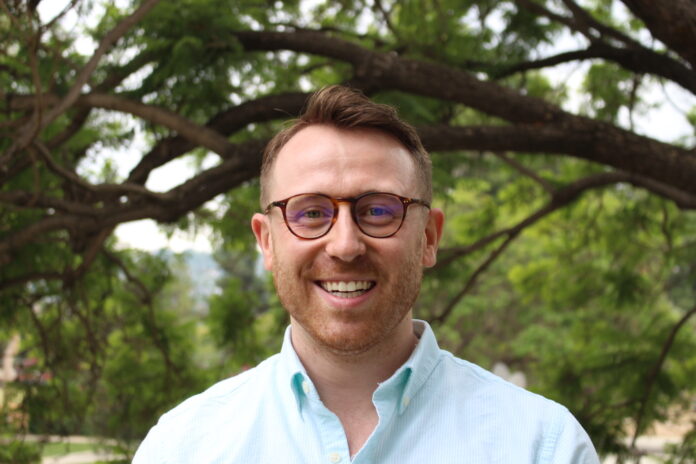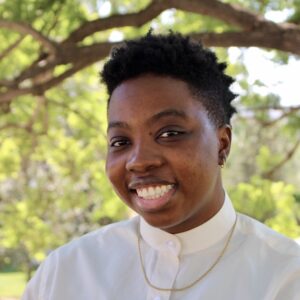
Professors hired during and after remote learning have returned to campus this semester. The transition to teaching in person has challenged these professors, but it has also created a welcome opportunity to reconnect with students and reevaluate their approaches to teaching.
Politics professor Eric Baldwin: Teaching small classes is ‘a great privilege’
According to Eric Baldwin, visiting assistant professor of politics, joining the Occidental community while the college transitions back to in-person learning has been a positive experience. He said he has enjoyed getting to know his students and appreciates the culture of caring and intellectual curiosity he says is present at the college. While it is Baldwin’s first semester teaching at Occidental, he has taught in 18 classes before as a PhD student at UCLA.
“I had experience in the early years of my PhD as a teaching assistant, then what’s called a teaching associate, which is a little bit more. Then a teaching fellow, which is a PhD student who’s given full supervision over a class. And then finally, I was allowed to teach my own courses,” Baldwin said.
However, by the time he was able to instruct his own classes, the pandemic had started, and Baldwin was teaching over Zoom. According to Baldwin, Zoom was beneficial for students who didn’t have the time or means to commute to campus, but it depleted the personal aspect of teaching.
“Zoom, obviously, for public health reasons was necessary, and it also improved accessibility,” Baldwin said. “But you really don’t get that same connection.”
As a professor in American politics, he said one of his favorite activities to do in class is a political simulation.
“My students are now doing an exercise where they are pretending to be political consultants,” Baldwin said. “Nancy Pelosi has hired you to give her and the Democratic Party advice on how to win the next midterm election, and you have this much money. How do you budget that money? Which races do you put the money into, and how do you prioritize so that that party can keep a majority in the House of Representatives?”
According to Baldwin, Occidental’s small class sizes — compared to the much larger groups of students he taught at UCLA — enhance the sense of connection gained from in-person learning.
“It has been such a great privilege to be able to teach in a much smaller setting, with a small set of students and really get to know them — get to know their names, get to know their interests,” Baldwin said.
Critical Theory & Social Justice professor Claire Crawford builds community in the classroom

Claire Crawford, non-tenure track professor of Critical Theory & Social Justice (CTSJ), has been teaching at Occidental since Fall 2020, but she said she had never taught in person before this semester. This semester, Crawford said she is teaching the “Social Justice Bootcamp” course for her first in-person teaching experience.
Crawford said coming into the classroom and physically speaking in front of students for the first time was a scary experience.
“I remember just getting up in front of everybody,” Crawford said. “I stood up and everyone got silent. And I’m like … ‘Oh, Claire, you have not taught anybody in person, ever.’”
Crawford has been using in-person learning as an opportunity to facilitate connections in the classroom.
“I’m really into integrating music and sound into the class,” Crawford said. “I’ll start off with a song, and then ask everybody to stand up and go greet each other, go say hello to somebody new today.”
According to Crawford, this type of interaction is a way to build community in the classroom environment.
“Social Justice Bootcamp,” an 81-student class Crawford teaches, is described in the college’s course catalog as a place where students learn to exercise their rights, transform the institutions that affect their lives and are provided with tools to use in modern political and activist campaigns. In teaching these skills, Crawford said that she wants students to make their own definitions of what liberty means to them and to explore different strategies for how to achieve liberty.
“Everybody doesn’t have to be in the streets,” Crawford said. “Everybody may not be a writer, a speaker yelling into a microphone, but what is your strength, how can you still give back?”
English professor Mrinalini Chakravorty ‘jumped at the chance’ to teach at Occidental again
Mrinalini Chakravorty, visiting professor of English, has returned to Occidental for the second time in her teaching career. On sabbatical from her usual position on the faculty at the University of Virginia, Chakravorty originally taught at Occidental in 2015 and decided to come back this fall.
“I jumped at the chance because I had taught here once before,” Chakravorty said. “It was a very lovely experience.”
She said that the transition coming back into the classroom has created some challenges.
“There’s a lot of anxiety still, and a lot of tentativeness about how people gather,” Chakravorty said. “Some of the social habits of the pandemic are still with us, for good reason. I think that can be a little bit more isolating … we don’t have the same easygoing ways of encountering each other on campus.”
Still, Chakravorty said she can see the enthusiasm students have for being back in person.
“They seem pretty eager to be in the classroom again,” Chakravorty said. “Everybody seems to be working hard.”
Chakravorty also said that the pandemic has made her reconsider the way she evaluates students. According to her, students being present, engaged and committed to learning in class has become more important than formal letter grading.
“I don’t think grades are as important as I used to,” Chakravorty said. “The way we think about evaluation has to change, given the radical stakes of coming into class.”
![]()



































